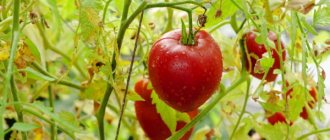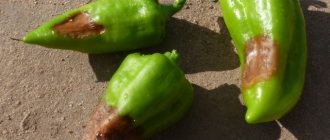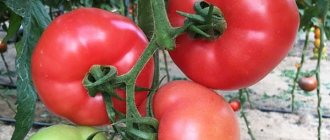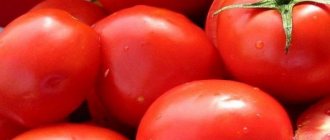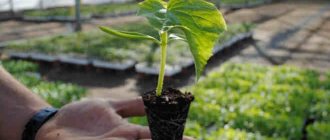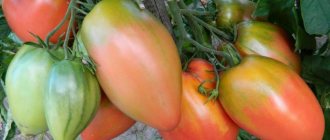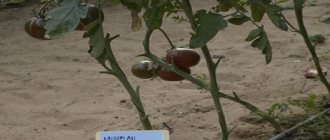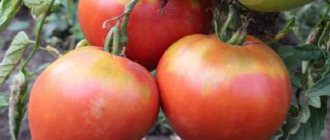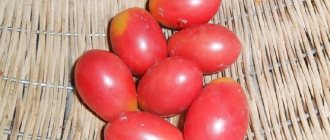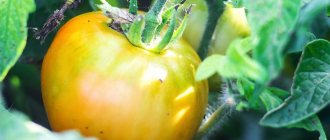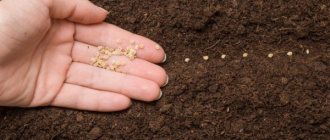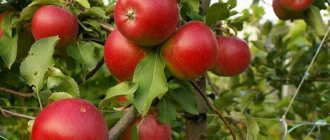Description of the variety
Tomato bushes are from 60 cm to 1 m in height. The leaves are medium in size, dark green in color, covered with down on all sides. The fruits have an elongated, plum-shaped shape. The tomato is mid-season, determinate, standard bush. The ripening period is 110-125 days from the first shoots.
Distinctive features
The Solokha variety is suitable for growing in central Russia and Siberia. It is characterized by a high rate of fruit ripening and a short growing season . An adult plant is resistant to diseases, viruses and pests. Ripe fruits correspond to the presented photo.
A distinctive feature of tomatoes is their ability to tolerate high humidity and low air temperatures. The variety has increased resistance to late blight and rot. Despite its small height, the bush has excellent taste and high yield.
Fruit characteristics and yield
The average weight of a tomato is 150-200 g, the largest ones weigh 250-300 g. They resemble a plum in shape. The pulp is dense and fleshy, of medium juiciness. The leather is durable and does not crack. Sugar content is within 4.5-5%. Fully ripened tomatoes have a raspberry-pink color.
Note : The taste is more sweet; sourness is almost completely absent.
Fresh tomatoes are suitable for long-term storage and can easily be transported over long distances. The section shows 3-4 chambers with seeds. The fruiting period is from summer to late autumn. On average from 1 sq. m get up to 7 kg of tomatoes.
How to grow seedlings
To ensure maximum germination of seeds, it is recommended to check their quality before planting. Initially, they look at the expiration date. If it expires, it is better to purchase another package. Next, the seeds must be poured into a glass of warm, slightly salted water. If they sink to the bottom, it means they are suitable for planting.
Seed preparation
Seeds are planted for seedlings after February 13-15. Depending on the region, the ripening period ranges from 100 to 130 days. Disinfection is carried out first. To do this, the seeds are soaked for a day in a solution of potassium permanganate. This way you can prevent fungal infection.
Many gardeners prefer to grow tomatoes of this variety from seeds of the Siberian Garden brand. Good germination of the material is noted.
Container and soil
It is better to plant seeds in special wide mesh containers. A box made of wood or plastic is also used. Since the variety is not picky, a standard soil mixture is used: for 1 part of turf soil, take 1 part of river sand and peat. Everything is thoroughly mixed and poured with a solution of 30 g of superphosphate and 10 g of potassium sulfate per 10 liters of water.
Sowing
In a prepared container with soil, make grooves at a distance of 2 cm from each other, place seeds in them and sprinkle soil on top. After two sheets appear, a dive is performed.
Growing and care
From the moment of planting until the plant is transferred to open ground, an average of 2 months passes. During this time, turn the seedlings daily with the other side facing the window. Place film or glass on top of the container to create a greenhouse effect. The seeds germinate well at room temperature (22-25°C). Water with a sprayer directly onto the soil.
Planting dates and care
Nastenka is a mid-season variety. The seedlings are moved to a permanent place at the age of 60-65 days. To determine the time for sowing seeds, a week is added to this time for the emergence of seedlings.
Preparing and sowing seeds
Tomato seeds are preheated for 20 minutes in water at a temperature close to 53° C. Then they are pickled and soaked until they swell. It is not necessary to carry out other operations for high-quality planting material.
The soil is taken from a store, intended for growing seedlings. Seeds are sown to a depth of 1-1.5 cm in rows at a distance of 4 cm from each other. Moisten the substrate, cover with glass or cellophane, and keep at 25 ° C.
Growing seedlings
As soon as the shoots appear, transfer the tomatoes to a cool room for a week and add light around the clock. Then the temperature is increased, it should be 20-22 ° C, daylight hours are reduced to 12-14 hours.
Tomatoes should be watered moderately but regularly. In the phase of 2-3 true leaves, they are planted in separate cups, and after another week they begin to feed them with complex fertilizers with a predominance of nitrogen.
When the soil warms up to 15° C, the seedlings can be moved to the garden, under the film - earlier. Tomatoes are first hardened on the street or balcony.
The breeder recommends that by the time of planting the first fruit cluster appears on the tomatoes.
Further care
Care for Nastenka tomatoes is the same as for other varieties:
- uniform regular watering;
- feeding with a complete mineral complex: in the vegetative stage, nitrogen is needed, during the formation of ovaries and fruiting - phosphorus, calcium, potassium;
- loosening or mulching the substrate;
- garter plant;
- The leaves under the brush that has begun to fill are removed.
According to the State Register, the Nastenka tomato requires regular plucking of excess shoots. The originator offers 3 options:
- The variety may not be formed at all. A lot of small tomatoes will grow.
- Moderate removal of stepsons will enlarge the fruits.
- With careful formation and management in 1 trunk, tomatoes can be planted compactly. This is the only way to achieve a maximum yield of 12 kg per square meter.
How to grow tomatoes
Tomatoes of the Solokha variety are not picky, so gardeners recommend planting them directly in open ground and not in a greenhouse.
Landing
Before planting plants in the garden, be sure to harden them off. To do this, in the room where the seedlings are located, open the windows briefly or take the boxes outside. Tomatoes of this variety must be regularly watered and fed with fertilizers.
Attention ! The time spent outside should be gradually increased from 15 minutes to 1 hour.
Seedlings are planted in open ground after preliminary fertilization with humus. It is best to place the bushes at a distance of 20-30 cm from each other or in a checkerboard pattern. On average, 5-6 bushes are planted per 1 m².
Care
In terms of care, the variety is not picky. To increase productivity, fertilize with organic fertilizers (compost or manure) or inorganic substances containing macro- and microelements, nitrogen, phosphorus, and potassium. Watering should be regular.
The photo clearly demonstrates what a healthy bush with tomatoes looks like.
It is best to use a drip system in which water is applied directly to the root rather than to the leaves. The bushes do not need pinching. The soil is loosened at intervals of 2 weeks, combined with weeding.
Features of cultivation and possible difficulties
Growing Solokh tomatoes is not difficult. Even a novice gardener can cope with this. Among the features note the following:
- sowing begins from February 15 to March 15;
- picking is carried out after the appearance of 1-2 true sheets;
- seedlings are fed 2-3 times with complex fertilizer;
- hardening begins 7 days before planting in the ground;
- in mid-May, seedlings are planted under film, and in early June they can be planted in open ground;
- the average age of seedlings is 60-70 days.
With regular watering, loosening, weeding and fertilizing, a harvest of up to 11 kg can be harvested from 1 m².
Diseases and pests
According to the description, Solokha tomatoes are resistant to various types of viruses and fungi. Their immunity is easily suppressed and tolerates verticillium, fusarium and tobacco mosaic. However, for prevention, it is recommended to treat the hole with a solution of boric acid and the bushes with potassium permanganate, which minimizes harm from bacteria and viruses.
Bushes often succumb to attack by Colorado potato beetles, aphids and lizards. To combat them, special means are used (“Aktara”, “Aktellik”). It is better to spray during the period of flowering or ovary formation, since the poison is poorly washed off from the surface of the fruit.
Tomato Solokha
There is a black de barao - for lovers of the exotic.
- Admiral. One of the most common varieties in central Russia. Tomatoes are good in canned food and salads. They ripen very quickly and are easy to care for.
- Dandy. This variety is a hybrid; it can be planted both in open ground and in a greenhouse. One of the tomatoes that tolerates cold, frosty climates well.
- Scarlet Mustang. Tall bush with small fruits (up to 300 g). Juicy pulp, thin skin and pleasant aroma make the scarlet mustang in demand among gardeners.
- Commissioner. The variety is a hybrid. It is distinguished by a high bush crown, small tomato fruits and strong immunity. Unlike all other varieties, it is characterized by resistance to all diseases.
When choosing a tomato variety to plant in 2016, remember that time-tested varieties do not have to be excluded, since new ones may not be accepted due to unsuitable conditions or climate.
READ MORE: How to save an apple tree in which a hollow has formed
There are also fruits weighing 250 grams.
Typically, such fruits grow when there are not many ovaries on the bush. The fruit has a plum-shaped shape - it looks like elongated cream. The tomato is quite dense and has a delicate raspberry-pink color.
Tomatoes of this variety are suitable for both fresh consumption and canning. When preserved, vegetables retain their shape and do not spread when processed with boiling water. Due to their rather large fruits, tomatoes are convenient to use for tomato juice.
In addition, tomatoes of this crop are characterized by good keeping quality. They can be transported over long distances, and they will not lose their presentation. The tomato is great for commercial use.
Before planting the seeds, they must be treated with a weak solution of manganese. This is necessary to ensure that the seeds are not damaged by fungus or pests.
Seeds must be planted in specially prepared soil. After the seeds hatch and the first leaves appear, it is necessary to dive.
You can plant seedlings when they are 2 months old. Plants should be hardened off before planting. It is recommended to treat the soil with a weak solution of manganese. The plant is not picky and does not require staking.
The main care is regular watering, loosening the soil and periodic feeding. If you want to increase productivity, you need to use drip irrigation.
Reviews
Igor, 45 years old
I grew Solokha for 3 years, always getting fruits that were quite large and corresponded to the description on the package. Every year I try to plant this variety, because from year to year the plant pleases with a high yield. Not a single variety I have planted has made me so happy. The fruits grew in different sizes, but always had a pleasant aroma and juicy taste. The plant itself, although tall, is not spreading. It does not require special care. The main thing is to water it on time and everything will be fine. I recommend!
Marina, 25 years old
I planted Solokha last year. I really liked this variety. In the summer, as usual, there were problems with watering, and sometimes there simply weren’t enough resources to water the plant properly, but it didn’t take offense and gave a good harvest. There were a lot of ovaries, and then large tomatoes. I will plant it next year too. I am very happy about this discovery. I regret that I didn’t know earlier.
- De-barao. A relatively new variety that has already caught the fancy of many. Its peculiarity is the height of the bush, equal to 2 meters, and a large harvest of tomatoes, which simply clings to the trunk of the plant. The fruits are medium-sized, fleshy and juicy. There is a black de barao - for lovers of the exotic.
The period of planting tomato seeds for seedlings is approaching. Tomatoes are one of the most popular and sought-after vegetables among summer residents, but many of them regret trying something new and are constantly looking for varieties that have not yet been grown. Those who are engaged in seedlings need to make a serious decision and decide on the choice of seeds, of which there are quite a lot. In this article we will discuss the best tomato varieties for 2016 and find out reviews from experienced gardeners.
The seeds of this variety are impressive because they are quickly accepted and germinate. Planted in open ground in June. Despite the small size of the bush, tomato fruits can reach 300 grams. Some people use this variety for planting in greenhouses.
- De-barao.
A relatively new variety that has already caught the fancy of many. Its peculiarity is the height of the bush, equal to 2 meters, and a large harvest of tomatoes, which simply clings to the trunk of the plant. The fruits are medium-sized, fleshy and juicy. There is a black de barao - for lovers of the exotic.
Farmer reviews
Reviews from gardeners about the Solokha variety are positive, although in some cases tomatoes produce less yield than the manufacturer claims.
Natalya, Sergiev Posad: “By mistake, I planted Solokh tomatoes in the greenhouse, and it was right. The fruits began to appear earlier than the specified period, and there were a lot of them. All tasty and meaty. The whole family ate fresh tomatoes and also appreciated the excellent taste of canned tomatoes.”
Yulia, Tomsk: “This is my favorite variety of tomatoes. I don’t know why, but in my garden it not only bears fruit before everyone else, but is also the first to ripen. Solokha’s fruits are large, and they can be harvested until the end of September in our region. The tomatoes taste amazing, so I recommend planting them.”
